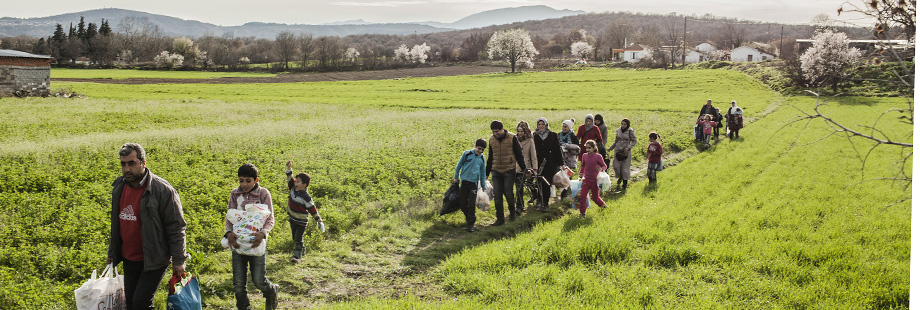Migration
In 2020, 281 million people lived outside their country of origin. More than a billion people have migrated internally. People decide to migrate for many reasons such as food insecurity, lack of decent rural employment, conflict and environmental degradation. FAO supports countries to make migration a choice, not a necessity.
FAO addresses the adverse drivers of migration and enhances the positive impacts for agriculture and rural communities.
In many rural communities, migrant workers are essential for agricultural production – which underlines the need for well-managed migration that benefits everyone. At the same time, migration can pose substantial challenges for food security, as losses in agricultural labour may negatively impact food availability in home-communities.
FAO’s policy work encourages countries to address adverse drivers of migration – particularly through partnerships and capacity development. To enhance the benefits of migration, FAO supports countries to offer migrants investment opportunities, e.g. through facilitating agri-business development.
Key policy messages
· Minimize adverse drivers. People often decide to migrate when their basic needs cannot be met in their home-communities. FAO supports governments to minimize the adverse drivers of migration – which range from environmental degradation, lack of decent rural employment, climate change impacts, including disasters, and pest invasion, to man-made conflicts. To provide viable alternatives to migration, FAO’s policy work supports rural development and transformation in home-communities through fostering decent work opportunities. Moreover, FAO supports access to services and infrastructure; increases the resilience of agricultural livelihoods to threats and crises, and mitigates the impacts of climate change.
· Enhance the benefits of migration. In many places, migrant workers are essential for agri-food systems and contribute to the host communities’ food supplies. FAO advocates for improved outcomes for migrant workers in agriculture, while enhancing benefits for host communities and families back home, including through seasonal labour migration schemes. FAO also enhances the positive impacts of migration for agriculture and rural communities through engagement of diaspora –which refers to migrants and their descendants living abroad who still maintain close ties to their country of origin; FAO supports an enabling environment for the diaspora to engage in agri-business development and employment generation in rural areas of origin through investment and transfer of knowledge and skills.
· Mitigate risks of rural out-migration on those left behind. Mitigate negative impacts of rural out-migration on those left behind.
Rural areas of origin may be challenged by the loss of productive work force and shortages of agricultural labour. In this regard, FAO works to minimize the risks for household members and rural people who stay behind- especially women and children. FAO aims to transform negative impacts of migration into opportunities, advance women’s economic empowerment, strengthen the enabling environment to improve access to education and health care systems and support rural institutions and services.
· Strengthen resilience of agricultural livelihoods for migrants and host communities. FAO works with countries and partners to promote resilient agricultural livelihoods for migrants and host communities. FAO supports migrants – including refugees and internally displaced persons (IDP) - to engage in food systems and agricultural livelihoods. This ranges from supporting migrants to access land and assets in host communities to assisting countries in carrying out food security and nutrition interventions. Importantly, the Organization’s policy work also aims to strengthen social cohesion and prevent conflicts over natural resources.
· Foster policy coherence. FAO fosters policy dialogues between migration and rural development stakeholders, improving coordination and policy coherence between migration and rural development policies and increasing capacities of rural development stakeholders to integrate migration into their work.
Featured resources



Report
The State of Food and Agriculture 2018. Migration, agriculture and rural development


